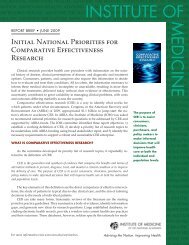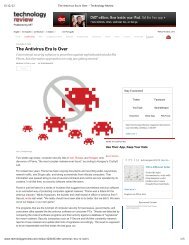Create successful ePaper yourself
Turn your PDF publications into a flip-book with our unique Google optimized e-Paper software.
Energy prices and consumer behavior<br />
Wars are fought over it. Business cycles rise and fall around it. Political<br />
elections are won or lost because <strong>of</strong> it. There are few prices in the<br />
world that have a bigger impact on individuals, businesses, and even<br />
governments than the price <strong>of</strong> oil. After falling steadily since the spring<br />
<strong>of</strong> 2011, the price <strong>of</strong> oil reversed course in late December and has risen<br />
sharply. The increase has been all the more surprising given the unseasonably<br />
mild winter much <strong>of</strong> the United States is experiencing. Warm<br />
winter weather traditionally puts downward pressure on energy prices<br />
because demand for heating falls as the temperatures rise.<br />
The spot price <strong>of</strong> West Texas Crude rose from $93 a barrel to $110<br />
between mid-December and early March. Prices for Brent Crude in<br />
Europe went from $102 a barrel to $126 over the same period <strong>of</strong> time.<br />
Rising oil prices have taken the price <strong>of</strong> gasoline at the pump higher by<br />
more than 50 cents a gallon in the United States.<br />
Oil consumption began declining in April 2011 when oil prices peaked<br />
and has accelerated over the past year even as prices declined in the<br />
latter half <strong>of</strong> 2011. As <strong>of</strong> March 2012, oil consumption was down 4.5<br />
percent from a year ago (see figure 6). Drops <strong>of</strong> this magnitude usually<br />
have been associated with recessions. The decline in oil consumption<br />
could be due to a number <strong>of</strong> factors. Energy productivity traditionally<br />
rises in the face <strong>of</strong> rising prices and continues to rise for several years<br />
following a price spike. Warmer winter temperatures are also holding<br />
down consumption <strong>of</strong> heating oil, contributing to some <strong>of</strong> the decline.<br />
The biggest decline, however, has come in gasoline.<br />
Gasoline is both economically and politically important. It is a<br />
commodity that most households purchase on a regular basis. It<br />
directly affects consumer confidence and approval <strong>of</strong> current political<br />
leadership even though that political leadership generally has very little<br />
to do with the actual price. It can also have a signficant impact on<br />
consumer behavior.<br />
Every penny increase in the price <strong>of</strong> gasoline costs U.S. consumers an<br />
extra $3.8 million a day. An increase <strong>of</strong> 50 cents a gallon translates to<br />
$190 million a day, $5.7 billion a month, and $68.4 billion a year. In<br />
January, household income, after adjustment for taxes and inflation,<br />
was up just $60 billion from a year ago. Higher prices for gasoline are<br />
showing up in two places: lower gasoline consumption and fewer<br />
miles driven.<br />
Gasoline consumption is down 6.7 percent from a year ago on a threemonth<br />
moving average basis, an even greater drop than the demand<br />
for oil (see figure 7). The drop is even more surprising given the severity<br />
<strong>of</strong> last winter when compared to this year’s mild weather. Milder<br />
weather should have prompted more driving.<br />
The drop in gasoline consumption represents a combination <strong>of</strong><br />
improved energy efficiency coupled with a significant decline in driving.<br />
Total miles driven on a 12-month moving average basis fell 1.2 percent<br />
in 2011 from a year ago (see figure 8).<br />
Over the past 40 years, there have only been three periods <strong>of</strong> time<br />
when the number <strong>of</strong> miles driven declined. All three were associated<br />
USA<br />
Geographies<br />
with deep recessions and sharply higher gasoline prices. While high<br />
gasoline prices limit driving, there are several others at work as well.<br />
Internet shopping continues to climb, taking share away from store<br />
purchases and reducing the number <strong>of</strong> shopping trips. Telecommuting<br />
has become a much more common practice and probably accounts for<br />
some <strong>of</strong> the decline as well.<br />
Rising energy prices have been a major factor in six <strong>of</strong> the past seven<br />
recessions since the first major oil price spike back in 1973–1974.<br />
Improved energy productivity, higher gas mileage, and greater use <strong>of</strong><br />
the Internet for both shopping and work has reduced but not eliminated<br />
the exposure <strong>of</strong> the U.S. economy to current and future rises in<br />
the price <strong>of</strong> oil. As was the case in the spring <strong>of</strong> 2011, the United States<br />
and the global economy are once more at risk from rising energy prices.<br />
Figure 6. U.S. petroleum products supplied<br />
Three-month moving average, year-on-year change through March 2012<br />
15<br />
12<br />
9<br />
6<br />
3<br />
0<br />
-3<br />
-6<br />
-9<br />
-12<br />
1970 1975 1980 1985 1990 1995 2000 2005 2010<br />
Source: U.S. Energy Information Administration<br />
Figure 7. Gasoline supplies delivered<br />
13-week moving average, year-on-year change through March 2012<br />
8<br />
6<br />
4<br />
2<br />
0<br />
-2<br />
-4<br />
-6<br />
-8<br />
1993 1996 1999 2002 2005 2008 2011<br />
Source: U.S. Energy Information Administration<br />
Figure 8. Total miles driven<br />
12-month moving average, year-on-year change through December 2011<br />
8<br />
6<br />
4<br />
2<br />
0<br />
-2<br />
-4<br />
1971 1975 1979 1983 1987 1991 1995 1999 2003 2007 2011<br />
Source: U.S. Department <strong>of</strong> Transportation<br />
19











